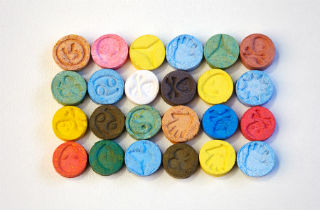How MDMA affects your brain and body
Written by Jennifer Taylor
MDMA is a synthetic drug first created in the early 1900s. MDMA is an acronym for the chemical name of 3,4-methylenedioxymethamphetamine. MDMA produces psychoactive effects and one word always associated with MDMA is ‘euphoria.’
In fact, MDMA produces euphoria while you are taking it and makes you want to feel close to the world. But what is it doing to your brain and your body to make you feel that way? Can you get addicted to MDMA and is treatment for ecstasy addiction necessary? Finally, where can you get ecstasy addiction help if you start to seek MDMA compulsively? More here, with a section for your questions about ecstasy at the end.
Immediate effects of MDMA
MDMA works on the neurotransmitters in the brain. Your body has many different neurotransmitters that act to transport information throughout the nervous system. Specifically, MDMA affects serotonin, dopamine, norepinephrine and possibly other neurotransmitters. However, MDMA has its greatest effect on serotonin, which is involved in mood, sleep and appetite.
MDMA helps the brain release serotonin, which causes the flood of good feelings and euphoria. A user experiences euphoria, greater sensitivity and desire for physical contact and intensified emotions. Coming down from MDMA depletes the brain of serotonin and other neurotransmitters, which can lead to depression several days after use.
MDMA’s effects on the body
MDMA’s effects begin within 90 minutes after taking it and can last up to 6 hours. The neurotransmitters released by MDMA cause numerous effects on the body. Dry mouth and nausea are common. Norepinephrine can increase the heart rate and blood pressure. The euphoric effects of MDMA can increase the desire for physical contact and sexual intimacy. However, taking MDMA can make achieving orgasm more difficult for both men and women. MDMA also releases hormones that make urination difficult and can cause dehydration. MDMA can raise body temperature, as well. Although many people think of MDMA as a harmless drug, deaths have been linked to hyperthermia and dehydration after taking MDMA.
MDMA’s effects on the brain
MDMA causes many effects when it releases neurotransmitters, but that also depletes the supplies in the brain. The loss of those neurotransmitters can lead to depression, anxiety and confusion when a user comes down from the drug. Still, the effect of MDMA on the nervous system is unclear. Researchers have not seen physical dependence on the drug, but cravings to avoid the depression occur.
The euphoria linked to MDMA comes from several sources. The main source is the floods of serotonin released. MDMA also reduces activity in the amygdala, which is associated with the fear response. And in the long term, MDMA may cause depression, anxiety, sleep disorders and craving for the drug.
Studying the long-term effects has proven difficult for several reasons. First, MDMA studies, which focus on the role of serotonin, usually exclude people with serotonin-related disorders like depression or bipolar disorder.
Are you taking ecstasy? Consider this…
How addictive is Molly, ecstasy, or pure MDMA? Not chemically addictive, but psychological dependence can develop after habitual use. Many people who take MDMA, either as a pill known as ecstasy, or in powder form (Molly) actually don’t know what they are dosing. Ecstasy pills have been mixed with everything from caffeine to ketamine and became popular in the 1980s dance scene, where the drug was known for producing good feelings and energy for dancing all night. Molly is considered a purer crystal form of MDMA, with no fillers. However, given the illegal nature of the drugs, there’s no quality control to say what is pure and what isn’t.
In addition, most people who take MDMA do not know the ingredients. Ecstasy has been cut with ketamine, cocaine, methamphetamine and fillers like fish food. People who would not hesitate to take a “harmless” drug like MDMA would think twice if they realized they were taking meth or cocaine. If you think you cannot control you cravings for MDMA, you may want to consider drug rehab.
MDMD effects and questions
Still have questions about the effects of MDMA? Please let us know and we’ll do our best to respond to you personally and promptly.








